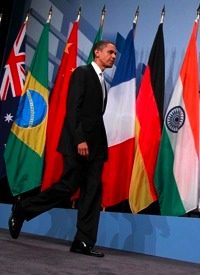
The recently concluded economic summit (June 26-27) of leaders of the G8 and G20 nations in Toronto was, according to most media coverage, an untidy row among those calling for continued government “stimulus” (Team Obama) and the rest of the major economies (led by Germany, the U.K., and China) calling for fiscal restraint and serious cuts in deficit spending. However, the much-ballyhooed disagreements over fiscal policy obscured the much more important result of the Toronto summit: the ongoing G8/G20 push to transform the International Monetary Fund (IMF) into a global Federal Reserve System, with financial regulatory powers to create money “out of thin air,” as the Fed does, without having to request replenishments from IMF member nations.
In their "Declaration" issued at the conference conclusion, the G20 summiteers proclaimed their commitment to cut government deficits in half by 2013 and stabilize or reduce the ratio of public debt to gross national product by 2016. The document is larded with statements that have little meaning, such as: "Monetary policy will continue to be appropriate to achieve price stability and thereby contribute to the recovery." Of course, "appropriate" monetary policy is a matter of great dispute — among economists, legislators, and policy makers.
In recognition of the lack of unanimity among the G20 members, the Declaration notes that "these measures will need to be implemented at the national level and will need to be tailored to individual country circumstances." Except for countries of the European Union, that is, which have already given up their economic sovereignty. For EU countries the "consultative mutual assessment" process will be conducted at the "European level."
Stimulus or Austerity
The struggle in Toronto was between camps that economist Peter Schiff playfully dubbed the "Stimulators" and the "Austereians." Mr. Schiff, the president of Euro Pacific Capital, has famously called the market’s major moves and repeatedly exposed the fallacies underlying the monetary and fiscal policies that brought on current economic crisis. (See "Peter Schiff Was (and Is) Correct on Economy" and "The Best Introduction to Economics in Print.")
Schiff, who recently qualified for the August 10 Connecticut Republican Senate primary, wrote on June 29 regarding the Stimulators and the Austereians:
Both warn that a worldwide depression will ensue if governments now make the wrong choices: the Stimulators say the danger lies in spending too little and the Austereians from spending too much. Each side also has their own economic champion: the Stimulators follow the banner of Nobel Prize-winning economist Paul Krugman, while the Austereians are forming up behind the recently reformed former Fed Chairman Alan Greenspan.
Fellow free-market economist Bill Bonner of The Daily Reckoning makes a similar analysis on the Christian Science Monitor blog referring to the Toronto fiscal spat as a showdown "between the people without a hope and the people without a clue."
Of course, many of the folks now running as "Austereians" — Greenspan most especially — are far, far from being believable in their new role as fiscal conservatives. Greenspan, it should be remembered, bears large responsibility for the Fed policies that created our financial debacle. He continually dissembled and deceived in testimony before Congress concerning actions and policies that were affecting the economic lifeblood of the entire planet — and then later gloated over getting away with his "Greenspeak" deception, proudly referring to his criminal conduct as "purposeful obfuscation" and "destructive syntax." (See “Taking Delight in Deception.”)
The fact that so many brilliant (or supposedly brilliant) economists routinely come to so many contradictory (and oftentimes completely opposite) conclusions about the proper fiscal and monetary solutions to any given situation should provide strong support for the free-market position that central banks and central governments should have less, not more, power over our money, our economic activity, and our financial institutions. Even if one assumes the best of intentions (a dangerous assumption) on the part of the "brilliant" ones entrusted with near life-and-death power over our economy, it is obvious that mistaken policies can have enormous, catastrophic consequences — as the unfolding events of the past couple years have amply demonstrated.
The "systemic risk" that is now invoked as an argument for still more government intervention in and management of the economy is itself the product of past government mal-intervention in affairs that should have been left to the market place. No individual, nor any group of individuals, can be so wise and omniscient as to foresee, comprehend, and manage the innumerable transactions, conditions, situations and imponderables that must take place in the complex operations of even a small community, let alone those of a major national economy.
However, man’s mental incapacity for so enormous a task is as nothing compared to his moral incapacity to handle the deity-like powers conferred on the Fed to "manage" the economy. Lord Acton’s famous dictum that "power tends to corrupt and absolute power corrupts absolutely" was a made-to-order description of the process that has brought about the absolute corruption of our financial system.
The solution, now, say those who have brought us to our current desolation, is to concentrate the power even further and to amplify the systemic risk by granting untold new authority to unaccountable global "experts" at the IMF.
"Supersizing" the IMF, Destroying the Dollar
As we have been warning in The New American for the past couple of years, the global elites driving the G8/G20 agenda have been aiming at creation of a "new economic order," and transforming the IMF into a global equivalent of the Federal Reserve as a central component of that new order. Supplanting and replacing the dollar with an interim "basket" of currencies and, ultimately, a global currency, is another component. (See Global Fusion: The G20, IMF, and World Government, "Supersizing" the IMF, and G-20 Advances New World Order, Media Admit.)
As we noted here leading up to the April 2009 G20 summit in London, the one-world "global governance" choir members "are all pushing the same ideas, to wit:
1) The IMF should be given huge new infusions of capital through member country "subscriptions."
2) The IMF should be encouraged to issue debt bonds to finance global loans.
3) The IMF should be "legitimized" by giving China and other emerging nations weighted votes in IMF policies.
4) The IMF should be given vast new global financial regulatory powers.
This same agenda continues in the G20’s above-mentioned Declaration, notwithstanding its (temporary) curtsey to national interests. The document states that "our reform agenda rests on four pillars." "The first pillar," it notes, "is a strong regulatory framework."
Foremost of the new institutions created to carry out this alleged "reform," the Declaration tells us, is the Financial Stability Board (FSB), an institution probably not even 1 in 10,000 Americans has ever heard of before now. (You might ask your Congressman if he has heard of this new global regulatory body). Only a matter of months ago this facility was known as the Financial Stability Forum (FSF). "Forum," of course, connotes a much less threatening gathering associated with debate and discussion, while "Board" connotes a body empowered to make executive and/or managerial decisions. By what authority was this new institution created and this new global power conferred? Who comprises the membership of this august body, and who regulates these regulators?
The FSB’s web site merely informs us: "The FSB is chaired by Mario Draghi, Governor of the Bank of Italy. Its Secretariat is located in Basel, Switzerland, and hosted by the Bank for International Settlements (BIS)." So our assurance of global financial well-being is safely in the hands of Italy’s equivalent of Ben Bernanke and a group of secretive banking gnomes in Basel! That should certainly be comforting, especially since the faceless, unaccountable BIS elite, are most likely the original inspiration for the now common term "bankster."
The unelected, untouchable, unaccountable banking oligarchy of the BIS/FSB and the IMF figure large in the "new economic order." The FSB informs us in its "mandate" that it will "collaborate with the IMF" and "implement international financial standards (including the 12 key International Standards and Codes)." The first four of those twelve global "Codes," created by the IMF, are:
• Code of Good Practices on Transparency in Monetary and Financial Policies
• Code of Good Practices on Fiscal Transparency
• Special Data Dissemination Standard
• General Data Dissemination System
Where is Congress in all of this? Where is there any authority in the U.S. Constitution for Congress or the Executive Branch to empower international bodies to usurp our national and state sovereignty in these matters?
The G20 documents are replete with genuflections to "transparency," as are the conferences, speeches, and documents of the IMF and the Federal Reserve. However, the Federal Reserve has repeatedly refused to divulge information to Congress and the American people concerning where, and to whom, and under what conditions the Fed has dispersed hundreds of billions of dollars in bailouts. Likewise, the Fed has appealed and re-appealed court decisions ordering it to turn over bailout documents to a coalition of news groups suing under the Freedom Of Information Act. Can we reasonably expect that international central bankers sitting beyond the subpoena power of our legislators and prosecutors and beyond the jurisdiction of our courts to be even more forthright, open, and solicitous of the public’s right to know?
The new G20 Declaration states: "We have strengthened our commitment to the IMF/World Bank Financial Sector Assessment Program (FSAP)." It continues:
The International Financial Institutions (IFIs) have been a central part of the global response to the financial and economic crisis, mobilizing critical financing, including $750 billion by the IMF and $235 billion by the Multilateral Development Banks (MDBs). This has underscored the value of these institutions as platforms for our global cooperation….
We commit to strengthening the legitimacy, credibility and effectiveness of the IFIs to make them even stronger partners for us in the future.
That’s nearly a trillion dollars. Granted, over the past 24 months that once awesome trillion sum has lost a bit of its shock and awe, but that’s still not a pittance to be sneezed at. Naturally there is no cause to question the methods, motives, and objectives by which and for which these vast sums were "mobilized" by the all-wise, pure, and selfless international servants of the highly "valued" IFIs and MDBs. Right?
The Declaration further states: "We commit to strengthening the legitimacy, credibility and effectiveness of the IFIs to make them even stronger partners for us in the future."
But that’s not all; the G20 is just getting started. Despite all its talk about national fiscal restraint, the G20 plan is very expansive regarding global spending/lending through the IFIs/MDBs. In a self-congratulatory back-pat, the Declaration boasts that "we have fulfilled our Pittsburgh Summit commitment on the MDBs. This includes $350 billion in capital increases for the MDBs, allowing them to nearly double their lending."
Moreover, it says: "We will fulfill our commitment to ensure an ambitious replenishment for the concessional lending facilities of the MDBs, especially the International Development Association and the African Development Fund."
November Summit in Seoul
The G20 Declaration calls for "an acceleration of the substantial work still needed for the IMF to complete the quota reform by the Seoul Summit and in parallel deliver on other governance reforms," which in globalist parlance means packing in a whole lot more power and money transfer capabilities by the time the G20 gathers again in November in Seoul, South Korea.
Photo of Obama at G20 Summit: AP Images
The following articles provide some of The New American’s extensive coverage of the G20/IMF agenda that can be accessed online:
Global Fusion: The G20, IMF, and World Government
"Conspiracy Theorists" Not So Crazy After All
Globalization Driven by New, Apocalyptic Horsemen
Globalization Talk at Davos
The G20 Push to "Supersize" the IMF
World Economic Forum Pushes Global Controls
Agenda Behind Brown’s "Global New Deal"
Is Obama’s Bank Tax a Prelude to a Global Tax?
IMF Seeks New Mandate, Global Currency



